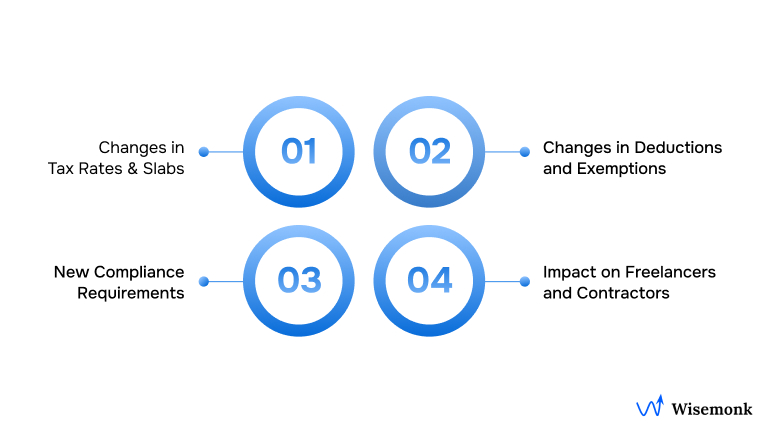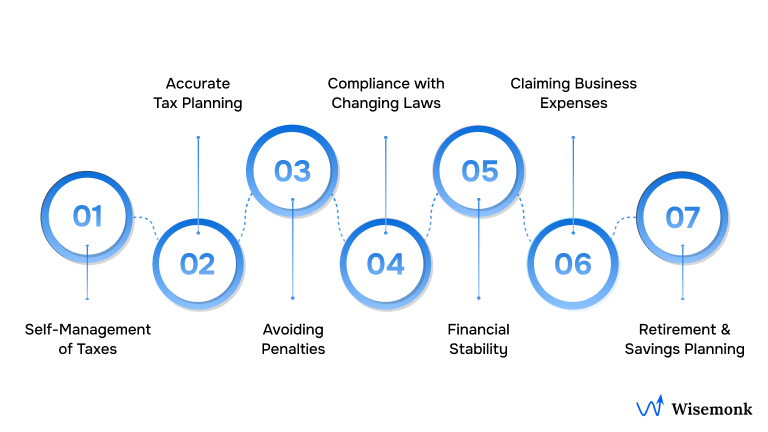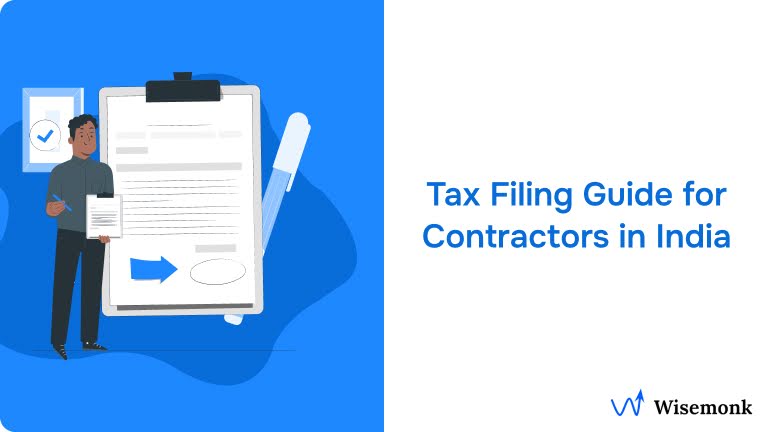Tax season can be overwhelming, especially for independent contractors. This guide will walk you through filing taxes as a contractor. Whether you're navigating through multiple income streams or figuring out which deductions apply, we've got you covered.
Fundamental Changes for the 2025 Tax Season

The Indian tax landscape continues to evolve, and 2025 brings several vital updates that contractors and businesses should be aware of. Whether you're a self-employed individual, contractor, or managing a team, these changes could impact how you calculate your tax liabilities and file returns. Staying updated with these changes is crucial to ensuring compliance and optimizing your tax strategy.
Changes in Tax Rates and Slabs
For the 2025 tax season, the Indian government has revised income tax slabs to account for inflation. These changes offer relief to middle-income earners while increasing taxes for higher-income groups. The tax-exempt limit has been slightly raised, benefiting contractors and freelancers.
- Old Regime: Previously, contractors could take advantage of deductions and exemptions.
- New Regime: The simplified regime now offers lower tax rates but fewer deductions, making it easier for taxpayers to calculate their liabilities.
Changes in Deductions and Exemptions
Key deductions and exemptions have been adjusted, particularly impacting contractors and freelancers:
- Standard Deduction Increase: Higher standard deductions for salaried individuals and pensioners may benefit contractors under certain conditions.
- Section 80C: The investment cap has been increased, encouraging long-term savings.
- Home Loan Deduction: A slight increase in deductions for home loan interest under Section 24.
New Compliance Requirements
New compliance measures are in place for 2025, affecting contractors:
- Mandatory Aadhaar-PAN Linking: Contractors must link Aadhaar with PAN to file returns.
- Advance Tax Rules: New guidelines make accurate advance tax calculations critical to avoid penalties.
Impact on Freelancers and Contractors
The simplified tax regime appeals more to contractors who prefer easy calculations over claiming multiple deductions. Contractors must also focus on meeting stricter GST compliance standards, including timely filings and proper invoice management.
Why Do Contractors Need to Understand Tax Policies?

If you’re an independent contractor, the tax compliance burden falls squarely on your shoulders. Unlike employees, contractors don’t have taxes automatically deducted. Unlike traditional employees, you are responsible for ensuring your tax obligations are met accurately and on time.
Here’s why staying informed about tax policies is essential:
1 Self-Management of Taxes
- No Automatic Deductions: Unlike salaried employees, contractors don’t have taxes withheld from their payments. This means you must calculate, file, and pay taxes independently.
- Quarterly Tax Payments: Contractors often need to pay advance taxes quarterly, making it essential to track income and calculate liabilities regularly.
2 Accurate Tax Planning
- Income Estimation: Contractors experience variable income. Understanding tax policies helps you estimate your earnings and save enough for tax payments.
- Deductions & Exemptions: Knowing what deductions you can claim (such as business expenses, travel, or equipment costs) allows you to reduce your taxable income effectively.
3 Avoiding Penalties
- Late Payments: Missing tax deadlines can result in significant penalties. To avoid fines, contractors must understand the due dates for tax payments (like GST advance tax).
- Interest on Underpayment: If you underpay your taxes, you may face interest charges. Accurate understanding of tax policies helps ensure you meet your total tax obligation.
4 Compliance with Changing Laws
- Frequent Tax Updates: Tax laws, especially for contractors, can change annually. Being aware of updates, like new tax slabs or revised GST rules, helps you stay compliant and avoid surprises during filing.
- GST & Other Taxes: If your services fall under GST, understanding how to file correctly is crucial for compliance and to avoid legal issues.
5 Financial Stability
- Proper Budgeting: Understanding taxes helps you set aside the right amount from your income to cover tax obligations, preventing financial strain when payments are due.
- Business Expansion: For contractors looking to grow, tax knowledge is essential for planning expansion, hiring employees, or purchasing new assets.
6 Claiming Business Expenses
- Maximizing Deductions: Contractors can deduct business-related expenses (such as office supplies, travel, or software) from their taxable income. Knowing which expenses qualify helps reduce your overall tax liability.
7 Retirement and Savings Planning
- Tax-Saving Investments: Contractors must understand how tax policies can affect their retirement savings plans, such as contributing to tax-advantaged accounts like PPF or NPS under Section 80C.
Eligibility and Definitions
Many individuals working in India offer services as freelancers or contractors. You likely fall under this category if you provide services contractually without being on an employer's payroll.
Who Qualifies as an Independent Contractor?
To qualify as an independent contractor in India, you must work under a contract or agreement for specific services. This means you control how, when, and where your work is done. You aren't considered an employee because your client isn't responsible for your tax deductions.
- You work on a project-by-project basis.
- You have the freedom to choose how you complete tasks.
- You aren't entitled to benefits like health insurance or paid leave.
As an independent contractor, one of your significant responsibilities is to calculate and file contractor taxes yourself.
Distinguishing Contractors from Employees
Employees have taxes deducted directly from their salaries by their employer. Independent contractors, however, handle this on their own, which brings in the question of how to do taxes as an independent contractor. Here’s a table distinguishing contractors from employees:
Frequently asked questions
How is contractor income taxed in India in 2025?
Contractor income is generally taxed under the heading “Profits and Gains of Business or Profession.” The applicable income tax slab rates for individuals apply, along with GST obligations if annual turnover crosses the threshold (₹20 lakhs for services in most states). Contractors must also account for advance tax payments on a quarterly basis to stay compliant.
Do contractors need to pay GST in India?
Yes, if a contractor’s annual revenue exceeds the GST registration threshold, GST must be charged and filed. The current threshold for most service providers is ₹20 lakhs (₹10 lakhs in some special category states). However, contractors providing services to international clients may qualify for zero-rated GST under export of services.
What tax deductions are available to contractors in India?
Independent contractors can claim deductions for expenses directly related to their business. This includes office rent, internet and phone bills, travel expenses, professional fees, equipment depreciation, and subscriptions to software. Section 80C, 80D, and 80G deductions may also be applied for eligible investments, insurance, and donations.
Do contractors need to pay advance tax?
Yes, contractors must pay advance tax if their total tax liability for the financial year exceeds ₹10,000. Advance tax payments are made in four installments (June, September, December, and March). Missing these deadlines can result in penalties and interest charges under Sections 234B and 234C.
How should contractors handle foreign income in India?
Foreign income received by an Indian resident contractor is taxable in India. However, if taxes are already paid abroad, contractors may claim relief under Double Tax Avoidance Agreements (DTAA). Maintaining proper documentation such as Foreign Inward Remittance Certificates (FIRC) is essential for compliance.
What common mistakes do contractors make when filing taxes?
Many contractors fail to account for advance tax, ignore GST obligations, or miss eligible deductions. Others underreport income from multiple clients or don’t maintain adequate expense records. Such errors can lead to penalties, audits, or higher tax liabilities than necessary.
Can contractors file taxes themselves or should they use a professional?
While contractors can file taxes themselves using online portals, many choose to work with a Chartered Accountant (CA) or tax consultant. Professionals ensure accurate filing, maximize deductions, and keep up with frequent tax law updates. For those with foreign clients or multiple income sources, professional help is strongly recommended.


.png)
